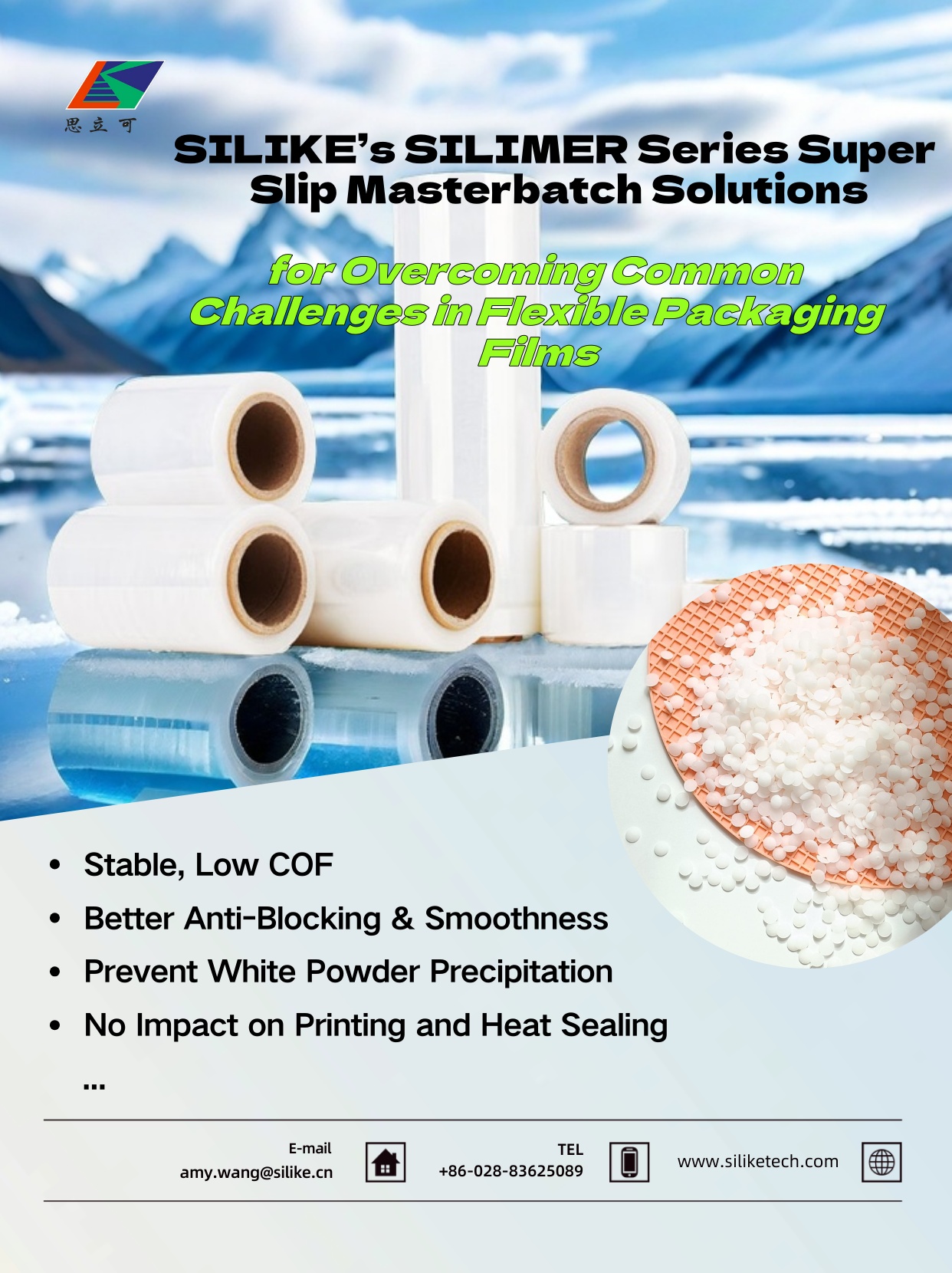In the world of flexible packaging , achieving optimal performance in film processing is essential to meet both production speed and end-user requirements. However, traditional slip additives—while essential for smooth processing—continue to create headaches for manufacturers worldwide.
The Struggle is Real: Common Challenges in Flexible Packaging Films
1. Additive Migration and Blooming
One of the most significant issues with traditional slip additives, like organic amides, is migration. Over time, these additives can move to the surface of the film, creating a white residue known as “blooming.” This not only affects the visual appeal of the packaging but can also lead to contamination risks, particularly in sensitive applications such as food packaging.
Impact on Visual Quality: Blooming can make the packaging look unappealing, leading to a poor customer experience.
Increased Coefficient of Friction (COF): As the additives migrate, they lose their intended effect, causing a rise in the COF. This impacts film smoothness and creates processing difficulties, slowing down production and affecting throughput.
2. Surface Quality and Clarity Issues
Migration of slip agents can also cause haze formation, which diminishes the clarity of films, especially clear packaging. This results in subpar aesthetic qualities, reducing the appeal of the product on the shelf. Moreover, migrated slip agents interfere with printing and coating, especially after corona treatment, leading to issues like the “fish-eye effect” in metallized films.
Impact on Branding: Packaging clarity is crucial for consumer perception and brand image, especially in sectors like food packaging and luxury goods.
3. Temperature Sensitivity and Seasonal Variability
Traditional slip agents can degrade under high thermal stress, compromising their effectiveness over time. Temperature fluctuations—such as those seen between seasons—also affect the performance of slip additives.
Degradation at High Temperatures: At higher temperatures, slip agents can break down, which results in an increased COF and potential film deformation during extrusion.
Seasonal Performance Fluctuations: Slip additives may be less effective in colder months, which results in inconsistent processing and poor film quality.
4. Compatibility Challenges with Other Additives
In multilayer films, slip additives must be compatible with other agents, such as anti-block additives, to ensure balanced properties. However, too much of one additive can interfere with the seal strength or other mechanical characteristics of the film.
Unbalanced Film Properties: Finding the right balance between slip performance and seal strength is essential to maintaining both ease of processing and product integrity.
5. Processing and Die Build-Up
Excessive use of slip additives can cause die build-up, leading to increased maintenance needs and production downtime. Regular cleaning is necessary to prevent the build-up from affecting processing speeds, leading to costly delays in production lines.
Operational Disruptions: Frequent die cleaning affects efficiency and increases overall processing time, negatively impacting profitability.
But there’s a solution that not only overcomes these obstacles but also drives performance forward.
The Solution: SILIKE’s SILIMER Series — Super Slip & Anti-Blocking Masterbatch
Innovate Beyond Traditional Slip Additives
SILIKE addresses the critical pain points of flexible packaging films with its groundbreaking SILIMER Non-Migrating Slip Solutions. Unlike conventional slip additives that migrate or bloom, the SILIMER series is engineered to stay exactly where it’s needed, offering long-term stability and performance — even under extreme conditions
What is SILIKE’s SILIMER Series Super Slip and Anti-Blocking Masterbatch?
SILIKE’s SILIMER Series Super Slip and Anti-Blocking Masterbatch is a specialized solution meticulously designed for plastic films. It incorporates a uniquely modified silicone polymer as its active ingredient, addressing the common issues associated with traditional slip agents, such as precipitation and high-temperature stickiness. This super slip additive significantly enhances the anti-blocking and smoothness of films while also improving lubrication during processing. It effectively reduces both the dynamic and static friction coefficients of the film surface, ensuring superior smoothness.
Additionally, The SILIMER Series Super Slip and Anti-Blocking masterbatch features a specialized structure ensuring excellent compatibility with matrix resins, preventing precipitation and stickiness. Ideal for PP (polypropylene) and PE (polyethylene) films, it delivers reliable performance without compromising printing, heat sealing, transmittance, or haze, making it the go-to choice for manufacturers prioritizing both efficiency and aesthetic excellence in flexible packaging.
For more details, visit: www.siliketech.com, or contact Amy directly at amy.wang@silike.cn. SILIKE: Your Trusted Slip & Anti-Block Masterbatch Manufacturer for High-Performance Flexible Packaging Films, SILIKE’s Non-Migrating Slip Solutions address common film production challenges, offering a longer-lasting and efficient alternative to traditional slip additives.
Post time: Mar-06-2025






